United Airlines is now pricing seat assignments the way gas stations price fuel…every penny counts.
United Airlines Looks To Gas Stations For Seat Pricing Model
If you do not have elite status in the MileagePlus program, you will pay extra for preferred or extra legroom (EconomyPlus) seats in the economy class cabin. Charging extra for aisle or window seats toward the front of the cabin, even without extra legroom, has netted United millions of dollars in ancillary fees over the last few years.
Traditionally, these seats have been priced at a round dollar amount, like $99 or $129 or $249. But now, these seats are priced at $99.99, $129.99, or $249.99 (just examples).
Here are just a few examples:
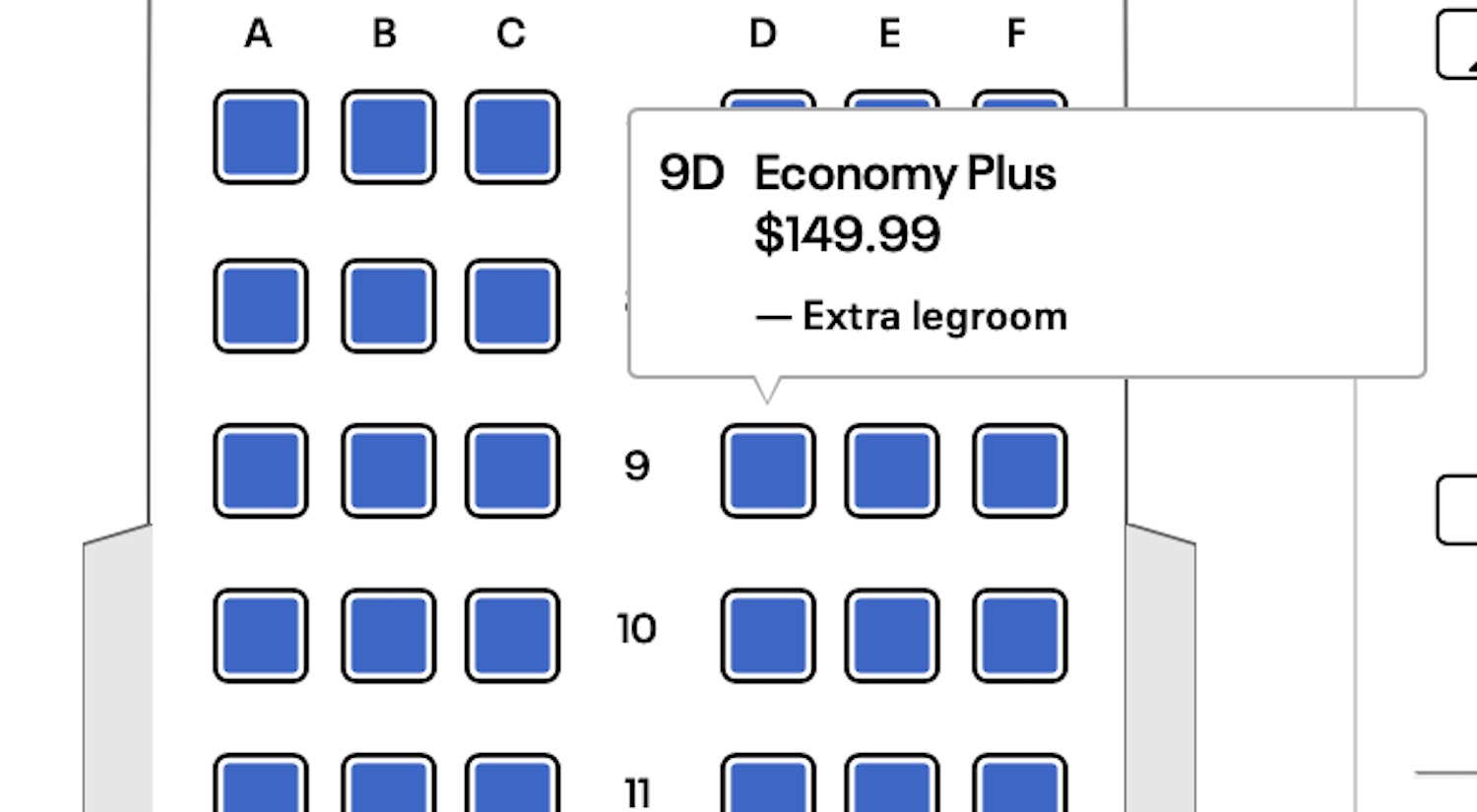
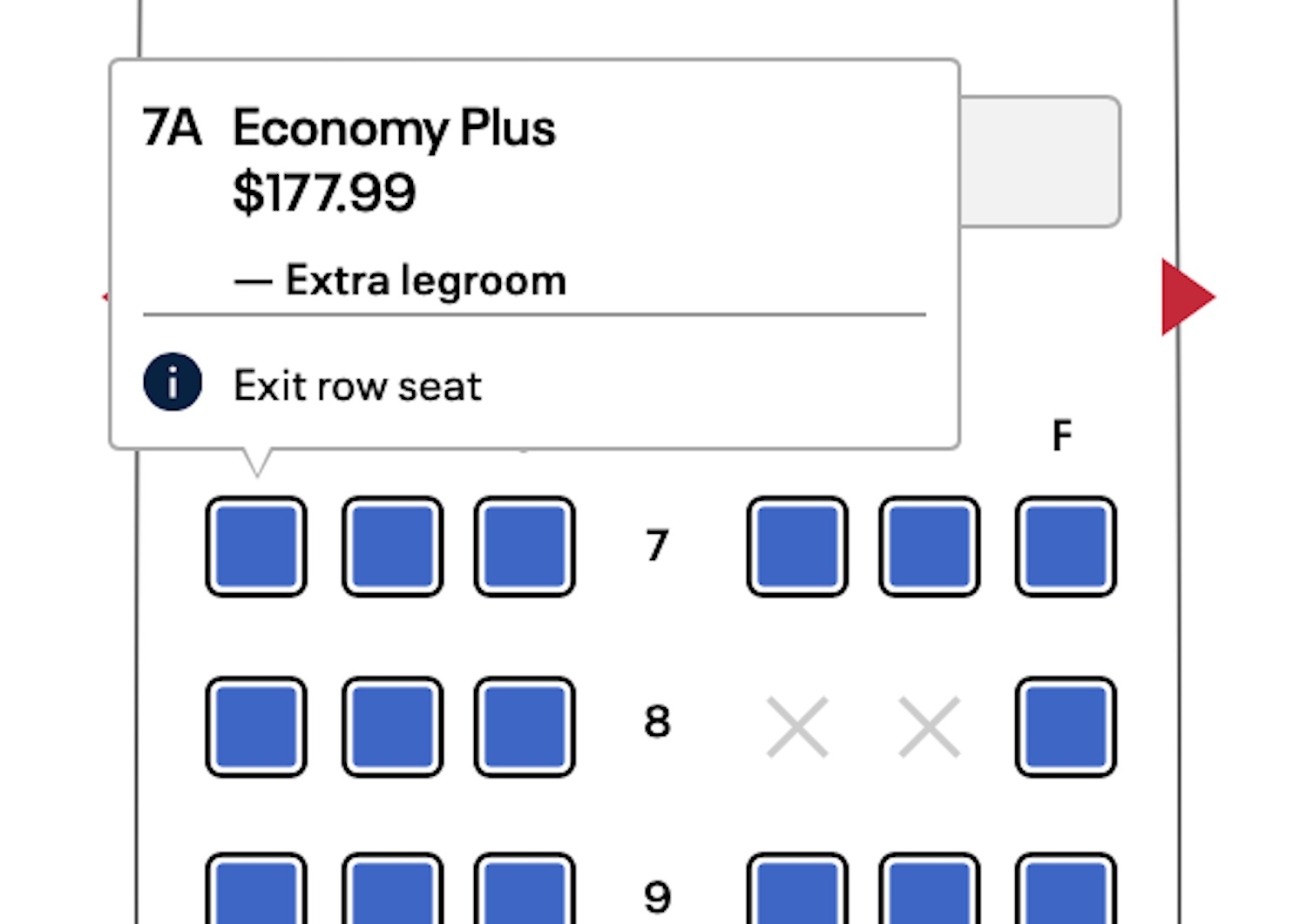
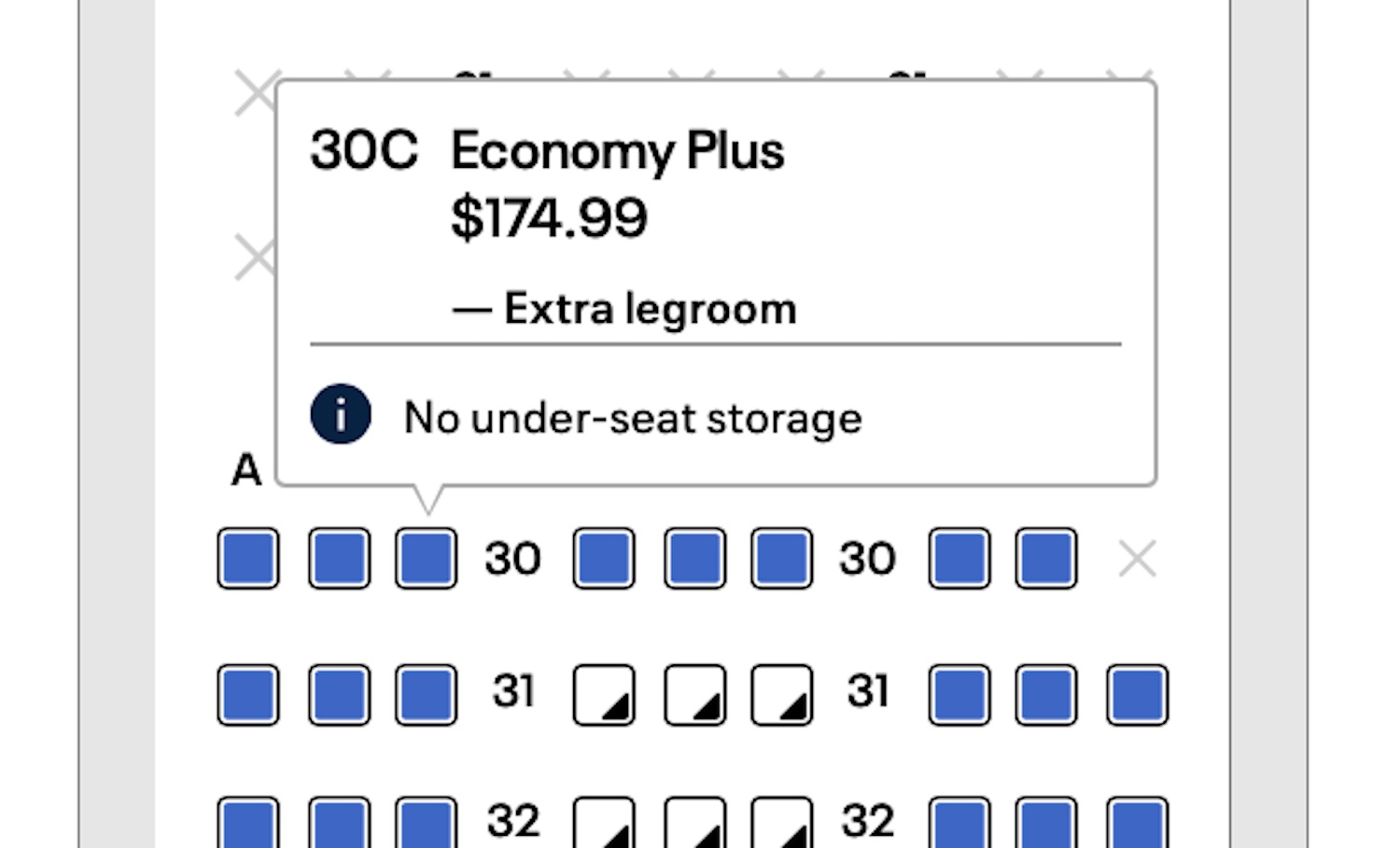
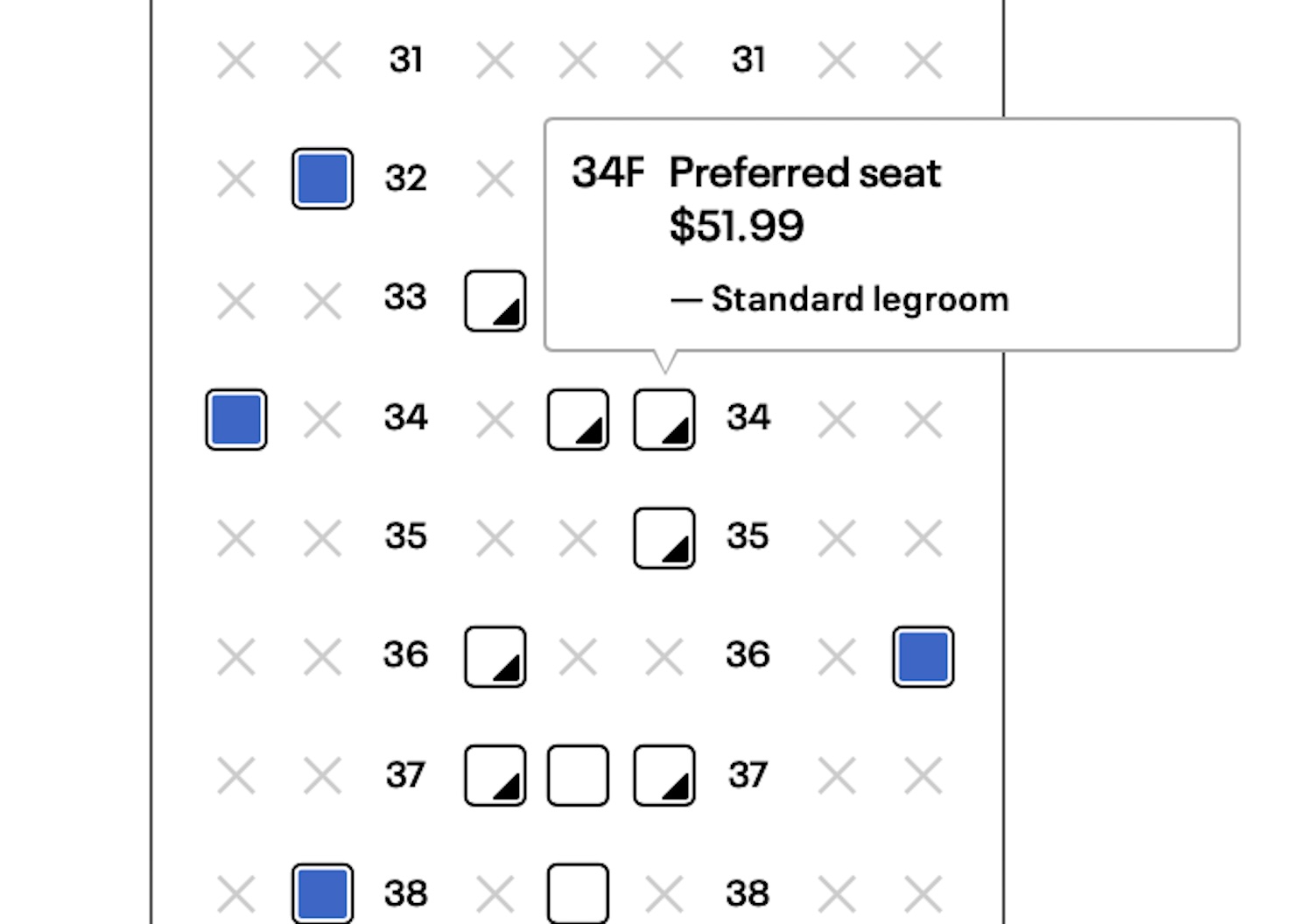
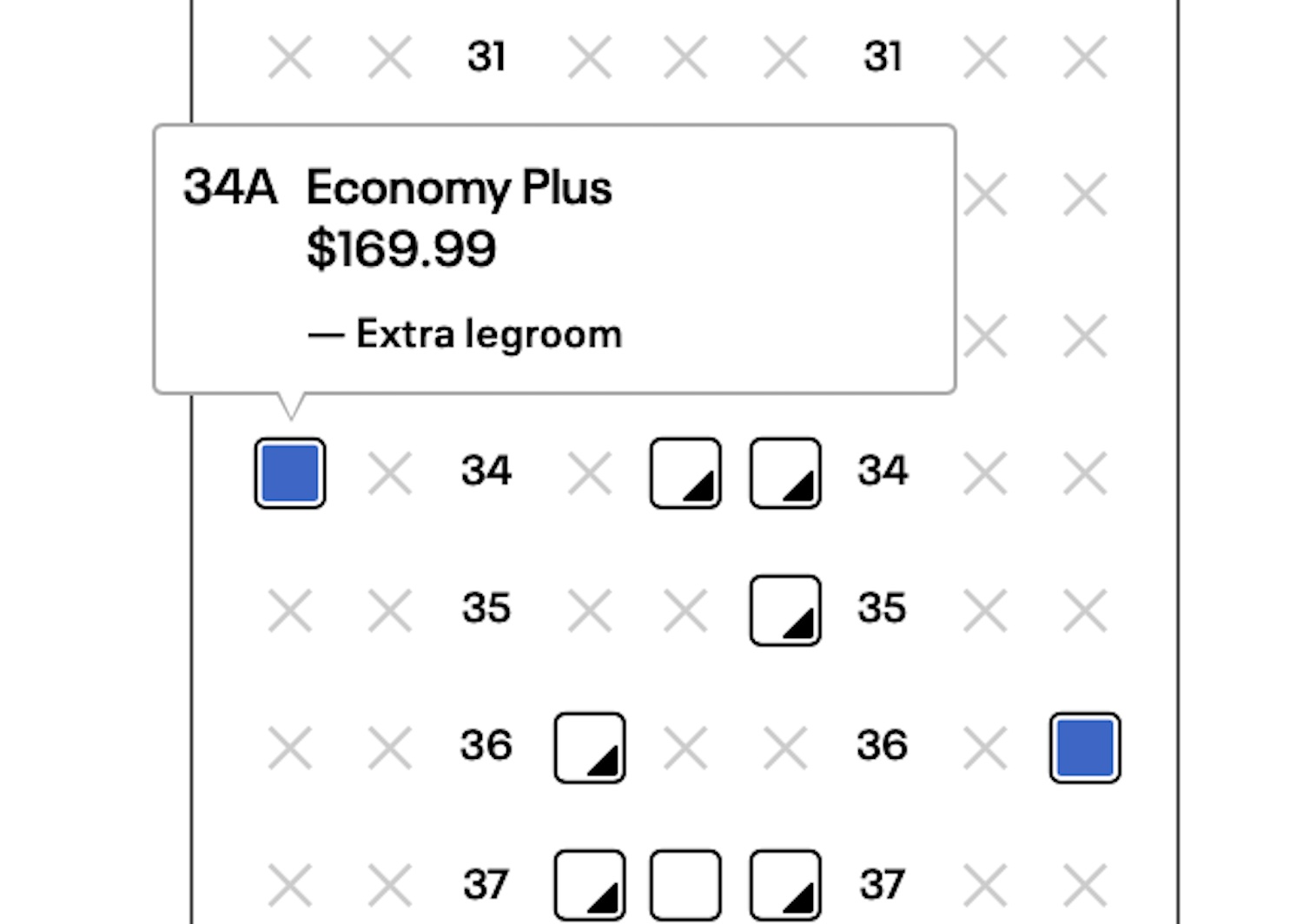
In the US, pricing is generally broken into dollars and cents, with no further breakdown of cents for most consumer commodities. But fuel is an exception. Look at any fueling station and you’ll always see that fuel is priced as, say $3.49 9/10 per gallon. Why $3.499 instead of just rounding to $3.50? Well, it makes consumers think they are getting a better deal, even if we are only talking about 1/10 of one cent.
Here, United can make millions of dollars per year on this little sleight of hand alone, with many consumers probably not noticing the difference between $99 and $99.99. That’s a lot more than a gas station 9/10 of a cent…
As an aside, I’m rather shocked at the price United is charging, even for some middle seats. Are you really going to pay $169.99 to reserve a middle seat on a transatlantic flight? I suppose if you want to ensure your party sits together, the answer is yes.
How long till internet becomes $8.99 and cheeseburgers become $11.99? How long till baggage becomes $40.99 and early boarding costs $39.99?
CONCLUSION
As the 99 cent only store chain closes across Los Angeles, United is picking up the slack by adding .99 to every one of its seat assignment fees. Like a gas station, the point is to squeeze a little more out of every transaction. It’s a sign of the times…
Hat Tip: View From The Wing




“… these seats are priced at $99.99, $129.99, or $249.00…” 😉
Re: “As the 99 cent only store chain closes across Los Angeles, …”, darn, my favorite stores after the Dollar Stores, which are now often $1.29 Stores. Inflation, terrible. I remember when a hot dog was a nickel and a Yankees or Dodgers ticket was 10 bucks .
Re: “ … United is picking up the slack by adding .99 to every one of its seat assignment fees.”, outstanding analogy, terrific wit, thank you, made smile.
Re: “… do not have elite status …”, another insightful comment, also a commonly taken-for-granted aspect of elite status, neck and neck in elite status taken-for-granted significance to free extra legroom seating and free check bags.
@Retired Navy and ER Doc … Thank you for your medical service to those in need .
BTW , I just read an interesting book about an Army medic thought to have been killed by lightning , and who then awoke , with various associated ailments . He went back to duty . Available on amazon .
Add an additional fee to those uncouth passengers who insist on bringing dogs and carry-on suitcases on board .
Do we need anymore evidance they are desperate for revenue and will do anything to nickle and dime us to death just like the LCC’s. UA turning into a bush league $hit show.
David, just curious what profit margin you think is acceptable for airlines. At high single digits (in the good times, not counting the periods when they lose money), their margins are significantly less than many other industries that don’t receive complaints about pricing, the way the airline industry does.
Are you familiar with the huge amounts of money airlines need to spend for new planes and the cost of running them and paying all of the airport fees and supporting infrastructure to fly them?
What is appropriate, in your mind? As it is, most of the coach tickets don’t cover the cost the airlines incur to run the flights, yet passengers have so many options to tailor the price to their needs, so maybe cut them some slack?
No problem, they can charge whatever they want and we’ll keep quiet when they return all the money the American tax payers paid to keep them in business instead of them declaring bankruptcy, wiping out all the greedy shareholders, and starting over with a new corporation. Nope, we would never think to inconvenience those fat cats with 10’s of thousands of shares so let’s let everyone subsidize this publicly traded company, and then when things get better post covid, the stocks will be great, money everywhere for all the equity stakeholders and executives. Somehow though, the citizens don’t get their money back, and get to pay for the right to pick a middle seat.
Maybe the CEOs and shareholders can make a little less money. That would solve a lot of the problems.
Agreed….
If the shareholders made less money, they wouldn’t be shareholders anymore. They’d sell and invest in a more profitable company.
Also, Scott Kirby’s salary is about .03% of the company’s revenue. You could pay him zero and it wouldn’t change much.
The real reason these airlines are struggling is the rising cost of jet fuel.
Random observations:
Jet fuel was more expensive at peak prices last year; higher in some parts of 2022
A decently run airline knows how to use hedging effectively to smooth out costs.
Non- fuel costs are between 60 and 80% of airline costs depending on the airline, year, cost of fuel, etc.
Adapts or Adopts? Geez. Did no one else notice this?
We struggle with the English.
Marketing studies have been done that pricing like United is considered to be associated with sub par quality. And prices rounded to whole dollars to be considered a sign of quality. It just cheapens the product.
They should make the most profit they can. That’s not the point.
New York
CNN
—
A United Airlines round-trip ticket from Denver to Dallas in late March is advertised for $91. But checking one bag at the airport both ways will cost an extra $80 — nearly as much as the flight.
Checked bag fees are hitting record highs as airlines up the ante. Bag fees are lucrative revenue for airlines and a way to save on taxes, airline experts say.
Last week, American Airlines said it was raising luggage fees by $5. American will charge $40 for customers who don’t first prepay online and $35 if they do. United, JetBlue and Alaska Airlines have also announced fee increases this year. (Southwest is the only airline that does not charge for checking bags. Delta charges $30 for a first checked bag, but has not raised its prices since 2018.)
ADVERTISING
Luggage fees feel like they’ve been around forever, but they are a relatively new phenomenon. In 2008, American became the first major US airline to charge customers for checking a bag, instituting a $15 fee. Airlines also charge extra for bags that weigh over a certain threshold, often 50 pounds.
In an aerial view, Walt Disney World’s iconic Cinderella Castle sits on the grounds of the theme park on February 08, 2023 in Orlando, Florida.
RELATED ARTICLE
The wealthy are cutting the line at the airport, Disney World and ski resorts
Charging for bags separately, a move known as “unbundling,” is a way to move part of the price out of the base airfare and into fees for tax savings purposes. said Gary Leff, an expert on the airline industry and founder of the travel website View from the Wing.
Domestic airfares are subject to a 7.5% federal excise tax, but that tax doesn’t apply to airline fees. So an airline can save $75 million in tax fees off its $1 billion revenue in domestic checked-bag fees.
Bag fees are also a huge source of revenue for airlines. In 2022, the latest year for which data is available, airlines collected $6.8 billion in baggage fees, according to the Department of Transportation. That figure was up 17% from pre-pandemic levels in 2019 and double from a decade ago.
Bag fees make up an increasing portion of airlines’ operating revenues. In 2020, baggage fees made up 4% of major airlines’ revenue, according to one study, and 21% of revenue for ultra low-cost carriers like Spirit and Frontier.
Bag fees also provide airlines with an opportunity to introduce perks for their profitable co-branded credit cards, such as the Delta SkyMiles American Express Card, which allows customers to check their first bag for free.
Airlines’ co-branded credit cards are a major revenue source for airlines, accounting for $25 billion in sales last year.
“Airlines are raising bag fees in part because of higher labor costs, and in part because they want to — and they can,” said Henry Harteveldt, the president of travel industry firm Atmosphere Research Group. “Passengers don’t like paying to check bags, but they generally don’t change airlines over the price of the checked bag fee.”
Rise of discount carriers
Bag fees first started because of challenges in the airline industry and the rise of discount carriers.
Airlines in 2008 attributed the introduction of baggage fees to then-record fuel prices. The price of crude oil jumped almost five-fold in just five years, from $27 a barrel in 2003 to $127 a barrel in 2008.
“It was tough revenue period and costs were increasing,” said Blaise Waguespack, a professor of airline marketing at Embry‑Riddle Aeronautical University in Daytona Beach, Florida. Fewer people were flying after the September 11 attacks, and the Great Recession also took a toll.
“It was one of those things that didn’t come to mind until after 9/11 and a tough economic recovery period,” he said.
After the introduction of new baggage fees, airlines reported a seven-fold increase in baggage fee revenues, from $464 million in 2007 to $3.4 billion in 2010.
An American Airlines Airbus A319 airplane takes off past the air traffic control tower at Ronald Reagan Washington National Airport in Arlington, Virginia, January 11, 2023. The US Federal Aviation Authority said Wednesday that normal flight operations “are resuming gradually” across the country following an overnight systems outage that grounded departures. (Photo by SAUL LOEB / AFP) (Photo by SAUL LOEB/AFP via Getty Images)
RELATED ARTICLE
Why AI can’t replace air traffic controllers
The introduction of bag fees was also a response to the rise of low-price carriers like Spirit in the United States and Ryanair in Europe.
These so-called “ultra low” carriers started offering low base fares and then charged extra for everything else, including carry-on bags in the case of Spirit.
Major airlines responded by introducing their own versions of these low fares, called “basic economy,” and unbundling their services with separate charges, such as checked luggage, seats with more leg room, and other amenities.
During the Covid-19 pandemic, most airlines pulled back on change fees because they believed people wouldn’t book flights if they still faced non-changeable, non-refundable fares at a time they were uncertain about flying at all. But airlines kept the bag fees in place and even raised them in an effort to make up for the lost revenue from change fees.
More recently, airlines said they hiked bag fees to offset higher costs. New contracts for pilots and other workers have included double-digit pay increases, and jet fuel prices are up more than 10% since the start of the year.
Ban the fees?
Luggage, seat reservation and other fees make it challenging for customers to compare flights and identify the cheapest fare.
This has allowed airlines to add revenue while dropping the price of the base airfare.
After the introduction of baggage fees, base airfares decreased by about $7, but the full price of travel (the base airfare plus the baggage fee) increased overall, a 2015 study found.
Bag fees have been a political punching bag. In 2011, former Sen. Mary Landrieu proposed banning airlines from charging for the first checked bag, but the bill failed.
An Airbus A319-100 plane of flag carrier Air Albania arrives at Tirana International Airport, Albania April 1, 2020. REUTERS/Florion Goga
RELATED ARTICLE
The world’s smallest flag carrier airlines
But eliminating bag fees could backfire, according to experts. If bag fees ended, major airlines would likely raise prices on airfare and other services.
“It undermines the business model of ultra low cost carriers like Spirit and Frontier that help keep airfare prices at major carriers in check,” Leff said.
The Transportation Department last year proposed a rule requiring airlines to disclose fees for baggage, ticket changes and family seating the first time an airfare is displayed, allowing customers to more easily compare prices.
“This new proposed rule would require airlines to be transparent with customers about the fees they charge, which will help travelers make informed decisions and save money,” Transportation Secretary Pete Buttigieg said.
But Leff said this plan is a minor step. Instead, ancillary fees should be taxed at the same rate as airfare.
“We should end differential tax treatment of airfare versus fees so that government policy at least does not encourage the proliferation of fees,” Leff said.
How about the fact that United charges the same fees to Star Alliance Gold members? The only benefits these passengers get is lounge access and baggage allowance, which I find ludicrous.
More of a retail model in general, then a gas station model. They do more of the ‘hehe, I’m sure they won’t notice this thing is $100 if we just price it at $99.99’. I’m not in market research, but I’d love to see what research shows are the actual benefits to businesses that use the ‘.99’ model vs. the ones that use whole $ amounts. Honestly, how many people are they really fooling?
Personally, it doesn’t matter much – the E+ pricing – .99 cent model or not – are mostly completely ridiculous and I’d honestly never pay it.
The extra .99 cents will add hundreds of thousands – if not millions – of dollars to their bottom line. The bean counting gouging continues unabated…
I kind of agree with the airline here. Instead of raising ticket prices for everyone. They are leaving some unwanted seats for cheaper and charging more for preferred seating. Why not.
They would look better though if they raised the prices to the preferred tier and then gave discounts for the unwanted seats. :):). Take this seat and save $39.99 off your airfare. 🙂
Thanks but I’ll stick to the back of the plane where the seats are still free. hopefully! The gas station approach would be like $5. 49 9/10.
Virtually every retail store in the nation uses .99 pricing